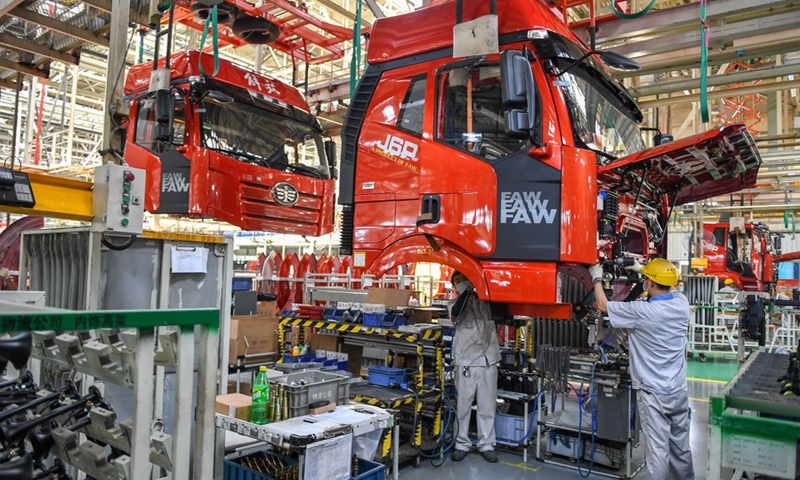
Workers assemble vehicles at the general assembly line of FAW Jiefang, a truck-manufacturing subsidiary of First Automotive Works (FAW) Group Co. Ltd., in Changchun, northeast China's Jilin Province, Sept. 1, 2020.(Photo: Xinhua)
China's official manufacturing Purchasing Managers' Index (PMI) in September stood at 50.1, the first time it recovered expansion since July, data from the National Bureau of Statistics (NBS) showed on Friday. The reading also beats market expectation, mirroring the resilience of the Chinese economy and its rebounding momentum despite weakened global demand, COVID-19 flare-ups and other factors.
The manufacturing PMI in September also jumped 0.7 percentage point from August, and compared with the reading of 49 in July, NBS data showed. A Reuters poll had placed expected PMI in September at 49.6.
"As a batch of policies to stabilize economy continued to manifest and the impact of heat wave retreats in September, the manufacturing industry warmed up and PMI returned to expansion territory," NBS senior statistician Zhao Qinghe was quoted as saying in a statement on the website of NBS on Friday.
In breakdown, most category indexes show an upward recovering trend. In September, a traditional peak season for production, the production index reached 51.5 percent, up 1.7 percentage points from the reading in August, boding well for accelerated factory activity in production side.
The expectation on production and operation activity index also reached 53.4 percent in September, gaining 1.1 percentage points from last month, reflecting a pick-up in the confidence of manufacturing enterprises.
In demand side, the new order index was 49.8 percent, up 0.6 percentage point from August. But the index was still below the 50-point mark separating growth from contraction as global demands remains slack.
Observers expect the manufacturing industry to maintain a "moderate" increase in the fourth quarter, as more stimulus policies take effect and skyrocketing energy price in Europe fueled certain supply chains being relocated to China.
"China's competitive advantages have not changed, so do its long-term economic fundamentals," Hu Qimu, deputy secretary general of digital-real economies integration forum 50, told the Global Times on Friday, adding that domestic consumption will continue expanding, further buttressing the world's second-largest economy.
As global headwinds and downward pressure mount, Chinese authorities in recent months have released a host of stimulus measures to shore up the economy. At a meeting on Wednesday aiming to further stabilize the economy in the fourth quarter, Chinese Premier Li Keqiang called for concrete measures to ensure the economy operates within a reasonable range in the fourth quarter.
Li said China "should promote the full implementation of policies in the fourth quarter with full effect, maintain recovery momentum, and ensure that the economy's operation is within a reasonable range."
The central bank, the People's Bank of China (PBC), announced on Wednesday that it will set up a special relending facility for equipment renovation and transformation, with a quota of more than 200 billion yuan ($27.64 billion), supporting financial institutions to provide loans for equipment upgrading and renovation.
Global Times




